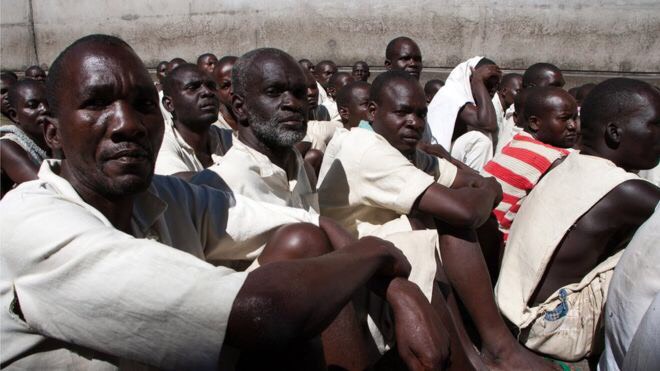- About
- Topics
- Picks
- Audio
- Story
- In-Depth
- Opinion
- News
- Donate
- Signup for our newsletterOur Editors' Best Picks.Send
Read, Debate: Engage.
| December 27, 2019 | |
|---|---|
| topic: | Death Penalty |
| tags: | #death penalty, #Botswana, #human rights |
| located: | Botswana |
| by: | Cyril Zenda |
The Botswana Prison Service announced that Mooketsi Kgosibodiba was executed at Gaborone Central Prison “in the early morning hours” of that day. He was sentenced to death in 2017 for killing his former employer five years earlier. The execution dashed the hopes of abolitionists and human rights groups, who wanted the country’s new leader, President Mokgweetsi Masisi, to end the death penalty in the southern African country.
Despite its reputation as a model for democracyin Africa, Botswana is the only country in southern Africa that still passes and actually enforces the death penalty. The country has consistently hanged people sentenced to death since its independence in 1966, a development that has only served to blot its otherwise decent human rights record.
After Masisi’s election victory in October, Amnesty International expressed hope that the new leader would be different from his predecessors on this controversial law.
“Mr Masisi has a chance to immediately demonstrate strong leadership by abolishing the death penalty. Justice is not served by executing people, and the world is moving away from this abhorrent and degrading form of punishment,” said Deprose Muchena, Amnesty International’s Regional Director for Southern Africa in a statement.
“There is no space for the death penalty in a country like Botswana, which has demonstrated a great leadership role on some difficult political issues, including by denouncing impunity for human rights violations on the African continent,” Muchena added.
There are now heightened fears for the fates of more than 50 people that are on the death row in Botswana, a record high in recent years. According to the Cornell Centre on the Death Penalty Worldwide, as of March 2018, there were 51 people on death row in Botswana, a notable increase from previous years. Four individuals were sentenced to death in 2017 and one person was executed. There was one person on death row at the end of 2016. No new death sentences were imposed in 2016 and one execution was carried out. There were four men on death row at the end of 2015. One new death sentence was imposed in 2015.
Botswana has executed about 50 people since independence in 1966.
According to Amnesty International, 142 countries have abolished the death penalty.
In its most recent death-penalty survey, the group pointed to sub-Saharan Africa as a “beacon of hope” in the global effort to eradicate the practice. Last year, Kenya ended the mandatory imposition of the death penalty for murder and Guinea became the 20th country in the region to abolish capital punishment for all crimes.
In Burkina Faso, the death penalty was removed from a new Penal Code that became law in June; this effectively abolished the death penalty for ordinary crimes. It remains in force in the country’s military law for exceptional crimes. In addition, a provision expressly outlawing the death penalty has been included in a new draft constitution.
In February 2018, President Adama Barrow of Gambia announced the establishment of an official moratorium on executions. In September, Gambia became the 86th State party to the Second Optional Protocol to the International Covenant on Civil and Political Rights, aiming at the abolition of the death penalty, an international treaty that commits Gambia not to carry out executions and take necessary measures to abolish the death penalty.
Of the 29 countries in sub-Saharan Africa that still retain the death penalty in law, only four – Botswana, Somalia, South Sudan and Sudan – carried out executions in 2018. At the end of 2018, at least 4,241 people were known to be on death row across sub-Saharan Africa.
By copying the embed code below, you agree to adhere to our republishing guidelines.
